#Homo sovieticus
Photo

Stachanow is my role model
1 note
·
View note
Text
ГОМО СОВЕТИКУС
Homo sovieticus
( с лат. — «Человек советский») — критическое и ироническое название советского человека. неологизм состоит из латинского homo (человек) и латинизированного эпитета «советский». выражение популяризировано писателем А. Зиновьевым в книге «Гомо советикус» (1982). оно берёт своё начало с попыток большевиков создать образ «нового человека». в немного другой но похожей форме «homo socialisticus» , термин был впервые употреблён в 1918 году С. Булгаковым , в книге «На пиру богов».
23 notes
·
View notes
Text
nobody talks in a more grandiloquent way about socialist revolutions than anti-communists. "The glorious revolution", "bastion of communism", "dictator of communists", "Homo sovieticus", etc.
10 notes
·
View notes
Text
There are so many Lithuanians who say, "We are not Eastern Europe, we are Northern/Central Europe"… I am from Ukraine, and I never was ashamed of being Eastern European. Why must I be embarrassed for the fact I live to the east from Poland and have russia as a neighbour? As nations, we can't choose the countries we share border with. Although Ukraine is technically Southern Europe, too, we share the unique world understanding as our Northern neighbours - since ancient, pre-Christian times - not always because of russia. However, russian propaganda invested a lot of money into people associating Eastern Europe with russia: communism, homo sovieticus, violence, and other crap which doesn't have to do anything directly with actual Eastern European culture and mentality.
I believe that we should put more effort into destroying those prorussian stereotypes about Eastern Europe instead of being ashamed and embarrassed, instead of letting other people mock us and our land for something we were never to be blamed for. We must not allow others to look down on us simply because they live to the west or east.
#Especially considering that life to the west or east sucks more these days imo no offence XD#Lithuania#Ukraine#Latvia#Estonia#Finland
5 notes
·
View notes
Text
Fuck, I love american wokeness in corporations
Homo sovieticus is leaving my body.

I'm at a seminar about gender pay gap and new UE directives that will come soon and I'm having an absolute blast.
8 notes
·
View notes
Text
@tobbpenztazembereknek
Áronkám te is homo sovieticus vagy?

Micsoda szánalmas hitvány alak ez hallod. Egyből az ELIT-be került, és NYUGATi lett az árulással. Ez az alak büdösebb, mint a rohasztott disznószar.
3 notes
·
View notes
Text
I'm currently watching the ~half of Star Trek DS9 that I hadn't already watched. There aren't really specific plot spoilers ahead.
Garak is wonderful. God, I love Garak. The Cardassian schtick is not being motivated by truth, and he's such a good Cardassian. They're a sort of Homo sovieticus caricature, but so well executed. Even the way he blinks and moves his head is lizardy.
One of the reasons Garak's performance works so well is that the character can hardly bear having pretend to be something as disgracefully unlethal as a craftsman, so he makes his pretense as transparent as he can. He has to ham it up, or else people might think he's serious. He has to make sure that everybody knows he's only a tailor ironically.
Insecurity is a very common character motivation, possibly even the primary or most common one. Even the Dominion doesn't really have or represent an ideology; rather, it's essentially a front for Changeling insecurity, which is portrayed as very soft and personal. (See also: Bashir, Dax intermittently, everything about Quark.)
There's this part where the Federation is dealing with Changelings and declares martial law on Earth. There's something wonderful about the portrayal of people who have just…never had to deal with a security state, a state of exception, the state really interfering with their lives, their lives being affected by Politics. Like, the identity of the president of the Federation has never once come up before! This is the first we're hearing of anything like "Federation politics". Communists by accident.
But the Federation can punitively void citizenship??? What
5 notes
·
View notes
Text




Homo Sovieticus is a catchy, sarcastic reference that’s become popular shorthand for describing millions of Hanna’s children. Humor helped us to survive the Soviet times. But what the label conceals is tragic. [...] It is about accepting lies in order to survive and prosper while forgetting the truth of the past. It is about them being the easiest prey to the post-truth era deceptions. So the cycle of lies and forgetting never breaks.
Though the Soviet Union collapsed decades ago, the Sovieticus syndrome hasn’t been entirely eradicated. Yesterday’s “Soviet Man” has morphed into today’s “Amnesiac Man”. Homo Sovieticus has mutated into Homo Oblivious.
— Homo Oblivious, an essay by Victoria Amelina (1986-2023)
#victoria amelina#ukraine#ukrainian literature#quotes#on memory#id in alt text#reading this made me sick by the way#russian war against ukraine#russian invasion of ukraine
6 notes
·
View notes
Text
The real Kitezh Grad - Mologa
The city in the photo below no longer exists. Not due to any war, pandemic, or famine - it was a man-made disaster. Maybe it didn't affect as many people as some other Soviet experiments and policies, but it is still a tragic story of how you can destroy part of your own history for mega projects.

Mologa was founded in 1149 (at least we have mentions of a settlement there during this period). During the 14th-15th centuries, it was part of the Principality of Molozhsk (the name was derived from a river rather than from a city). By the 20th century, it wasn't a big city - only around 10.000 people with 12 factories, a gymnasium 8 schools, libraries, a cinema, a post and telegraph office, a bank, a hospital, and a health center. But the region still had its value for future generations.
As for the territory, that would be submerged in the future, it was densely populated (for Russia) - around 130.000 inhabitants, with some places of cultural value - 3 monasteries (one founded in the 15th century, another in the 17th, and the last one at the end of 19th), multiple manors and several churches (5 just in Mologa, 4 of which were built from stone). The region was also pretty fertile because it was situated at the bottom of an ancient lake (yep, an interesting fact considering what happened to it later). It wasn't rich, but every year Mologa allowed up to seven thousand ships from the Lower Volga provinces to pass through its wharves.



It all started in 1932 when it was decided to build the Srednevolzhskaya hydroelectric complex. At first, only a small part of the region would be flooded - but the more you have the more you want to have. However, the construction organisers, having calculated everything, decided that if the level was increased by 4 m, the capacity of the plant would increase from 220 to 340 MW. It required a doubling of the land area to be submerged. Everything was decided by profit. The population was notified about the resettlement. The townspeople were transported out of Mologa for 4 years until the flooding began, with little to no belongings. Partially, they were compensated, and they also were employed at their new places of living.
But there were a lot of animals - both domesticated and wild - and the region had forests. What happened to them? Well, some domesticated animals were taken by their owners, while others died due to starvation or during flooding. The same fate awaited wild animals - most of them died during flooding. Trees were cut and, most of them were left there, creating obstructions on Volga and on the newly created reservoir.
Here are some photos of Mologa.
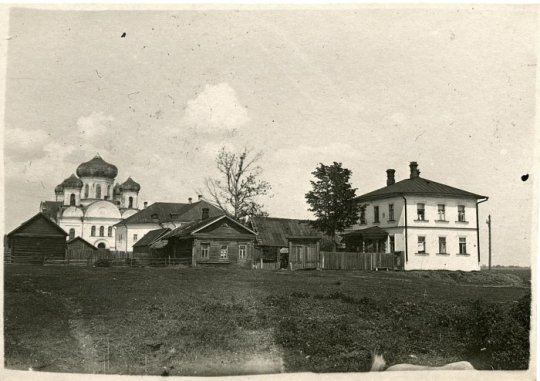
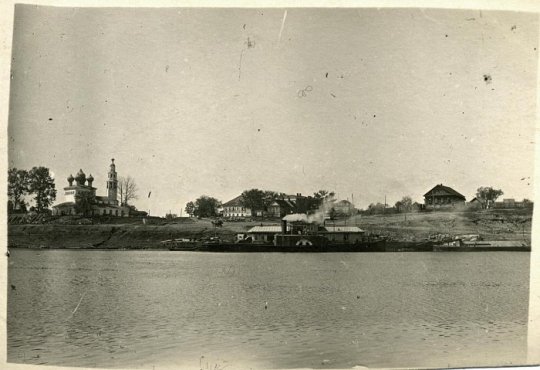
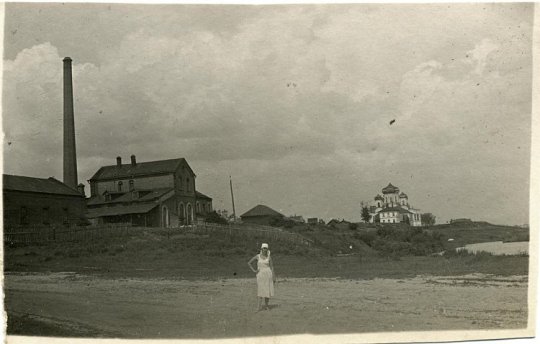
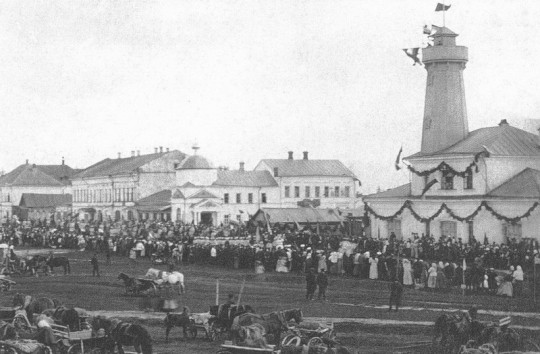
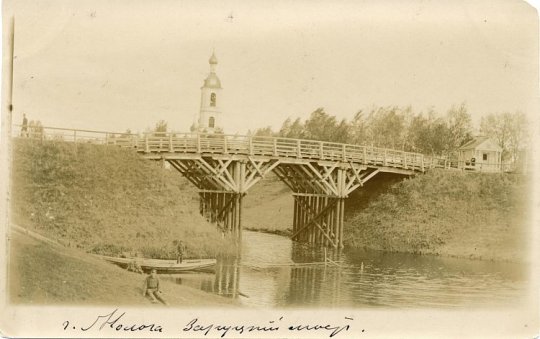
The culture of Mologa was similar to that of Yaroslavl Governorate, with some small differences - there were several unique holidays, and some differences in celebrations of major ones, it was also overall more rural and better maintained some older aspects of early Russian culture. But the main loss came from the displacement of people - they lost connection with their roots. And I mean not only their graves or houses but items that were inherited through generations - you couldn't take that much with you considering when and how the resettlement happened.
Why is this relevant? One of the key themes I want to explore in my story is the contrast between modern russian culture, which is more soviet than one might thing, and the older russian traditions. My goal is to show this difference. Throughout the story, characters embark on personal journeys to reconnect with their roots in various regions, seeking to understand their connections to the people who lived long before them. One character has ancestors from Lukovec, a settlement in the northern part of the flooded region.
Just a reminder - every culture that was under Soviet rule suffered one way or another. Creating Homo Sovieticus was the goal.
1 note
·
View note
Video
youtube
Homo Sovieticus czyli utopia w praktyce | Jędrzej Piekara
0 notes
Text
IL SE PEUT
Donnons un avenir
Aux enfants blancs
Dit Marion Maréchal
Lecture très droite
D'Orange blanche
Racines chrétiennes de la France
Plus en rapport avec la Gauche Cagoule
De François Mitterrand
Un racisme anti-blanc
Déclenché connement
Par en définitive le nazisme khrouchtchévien poutinien
Contre, un héritage stalinien
Kominform c'est certain
Ethique Homo Sovieticus du 9 mai 1945
Le communisme contre le racisme tous les racismes
Samedi 18 mai 2024
0 notes
Text
Israeli radio Первое радио with Марианна Беленькая
youtube
21:50 We are starting to receive questions from our radio listeners. I, well, if you allow me, I'll also ask my question and I ask a personal one. If you answer [Podolyak looks as if he couldn't be less interested]. On the stream of Евгений Киселёв, former Russian Deputy Prime Minister Koch said that your brother lives in Moscow and works for the ФСБ. You later refuted the ФСБ [he smirks] and said that you don't communicate with your brother. But I'm just wondering, did the war divide you or is it something completely different?
No [shakes head]. That's completely different, these are stories of 40 years. They left already during the Soviet Union. Our family is divided. So, there is no philosophy of military subjugation here. But yes, in fact, for a long time I perceived this as ? because to prove something that does not exist or to refute something that does not exist, it looks very strange. Of course, I don't have, and I have never had relatives neither in the system of the State Security Committee, nor in the system of the Federal Security Service of Russia. It is so obvious that it seemed to me that there was no need to talk about white white or white black and so, and that's all. There is no background here and there is no subject ever for--
I asked only because there are a lot of families that turned out divided by these wars, including, as I understand it, the family of the new, Oleksandr Syrskyi [he nods] and a lot of people are worried about this. From your point of view, in general, can this split someday be overcome, including a split in families?
No. No [shakes head].
That is, Russia, Ukraine, two nations have separated forever.
Let's do it correctly here. Look, everyone in the family-- Yes, we were in the Soviet Union, of course, right, and for example I was born in the Soviet Union in 1972. Of course, it was a slightly different system but from the point of view when states started to become independent, a very important sense of identity started to form who you are. It was also present in the Soviet Union, but they attempted to erode it through this fictitious internationalism, that is, there was a feeling that you, remember Alexander Zinoviev had "Homo Sovieticus", right, this attempt to blur all this.
In fact, identity, it is very important, that is, who you are from the point of view of how you perceive yourself in this world, how you perceive social connections, horizontal or vertical, attitude to power, all this was also different in different republics of the USSR. It disguised, I emphasise once again, the general Soviet ideology. But as soon as the countries got the opportunity to express their identity, national, ethnically oriented or not, or state-oriented, it all began to sharply remove Ukraine from the Russian Federation.
And here there are two differences. In families, that unfortunately were intertwined in the Soviet Union, each family member will decide for himself where he is, what values are a priority for him, how he perceives these values, where he wants to live, how he feels about such concepts as freedom, self-determination, and in general, competition as such. This will be everyone's choice and of course, but it will not be related to other things to choose from, let's say a state.
34:15 If we have already started talking about war, about military actions, today, for example, the agency Bloomberg wrote that Russia regained the initiative at the front and put Volodymyr Zelenskyy at a disadvantage. In this context, don't you regret, I mean President Zelenskyy's team, that you had to change Valeriy Zaluzhnyi to Oleksandr Syrskyi?
[Some of what he said:] I don't see, let's say, a fundamental change on the front line. I don't know what Russia's initiative is. There is no progress. We did not change Mr Zaluzhnyi for Mr Syrskyi. It was the team that was changed. It was updated.
50:05 Compromises are always the road to weakness, no matter how hard it may sound. By making compromises, you give hope to your enemy that he will always have the opportunity to put pressure on your weak points, and accordingly, will always take advantage of this and will always scale up the search for these places and will always find them. And sooner or later the amount of pressure that he can provide on these weak points will be excessive and this can lead to the collapse of the defensive formations as a whole.
47:11 could be a random look aside but 49:52 it seems as if he's looking at someone.
0 notes
Note
i mean. the entire reason i got into writing the essay i showed you is that i'm studying law after finishing my current career in literature so. yeah all marxists are the same.
this must be the totalitarian communist hivemind, homo sovieticus, I've heard so much about
5 notes
·
View notes
Text
Komuniści usiłowali stworzyć "homo sovieticus" (człowieka sowieckiego) i przeważnie im się to nie udało, bo komunizm choć był brutalny, to był siermiężny i miał ograniczone możliwości.
Natychmiast po przejściu setek milionów ludzi mieszkających na wschód od byłej "żelaznej kurtyny" spod okupacji komunistycznej pod okupację globalistów - nastąpiło ogromne przyspieszenie procesu formowania homo sovieticus: człowieka ogłupionego, zatrutego i wykastrowanego chemią, wydartego z korzeniami z ziemi, religii, patriotyzmu i w ogóle jakichkolwiek tradycyjnych, naturalnych wspólnot.
Te kilka krajów na wschód od byłej "żelaznej kurtyny" ciągle jeszcze różnią się pozytywnie od przegniłego na wskroś Zachodu tylko i wyłącznie dlatego, że zatruta chemikaliami żywność i "pranie mózgów" oraz infiltracja wszystkich aspektów życia przez masonerię zaczęła się w nich o 40 lat później. Wcale zaś nie dlatego, że były w jakimkolwiek sensie immanentnie lepsze, szlachetniejsze, lub doznające jakiejś specjalnej, boskiej opieki.
Komunizm nie miał interesu w likwidowaniu okupowanych przez siebie narodów nie dlatego że był dobry, tylko po prostu dlatego, że był technicznie zacofany (wynik wprowadzenia systemu ekonomicznego jeszcze bardziej sprzecznego z naturą ludzką niż monopolistyczny, socjalistyczny globalizm na dzisiejszym Zachodzie).
Komunizm potrzebował milionów żołnierzy i robotników, by zrekompensować ilością niższą jakość swej armii i gospodarki. Dlatego nie popierał zboczeń, pornografii, rozwodu bez orzekania o winie, śmieciowej "edukacji", rozpadu rodzin i spadku dzietności.
Plany naszych obecnych władców, globalistów są inne. Dążą oni do bezwstrząsowej, stopniowej likwidacji naszej rasy (będącej dla nich jedynym realnym, potencjalnym konkurentem), a potem również 97% z całej reszty ludności świata.
Nie potrzebują 8 miliardów ochroniarzy, prostytutek i kelnerów. Do walki wystarczą im małe oddziały zawodowców, do produkcji przemysłowej - maszyny. "Zaśmiecanie świata" przez nadmierną liczbę zbędnych istot mniej lub bardziej ludzkich jest dla nich sprawą pilniejszą niż cokolwiek innego.
Zlikwidowanie 97% populacji światowej stanie się łatwe po zlikwidowaniu ludzi zdolnych do zorganizowania buntu, mających wystarczającą do tego celu inteligencję i cechy charakteru (rasę białą). Globaliści wcale nie chcą żadnych wojen religijnych (np. z Islamem), czy rasowych - chcą powszechnego skundlenia się i zmieszania (mongrelizacji) wszystkich ze wszystkimi. Chcą by wszyscy zapomnieli o odrębnościach swych religii, języków, kultur, ras…
Ludzie, którzy urodzili się i uformowali swój obraz świata przed 1989 rokiem mają trudności ze zrozumieniem sytuacji, która jest już kompletnie inna, niż za czasów ich młodości, choć zmiany te nastąpiły stopniowo, podstępnie, zostały rozciągnięte w czasie. Więc tacy "niedzisiejsi ludzie" ciągle używają pojęć - skorup, z których dawno już wytchła wszelka żywa treść.
Naród, który jeszcze nie tak dawno miał medianę wieku dwadzieścia kilka lat, a naród z medianą ponad 40 lat - nie mają ze sobą nic wspólnego, choć mówią tym samym językiem i mieszkają na tej samej ziemi.
Kościół Wyszyńskiego nie ma nic wspólnego z kościołem Bergoglio, choć nazwa ciągle ta sama i te same świątynie, w których dziś celebrans siedzi odwrócony tyłem do tabernakulum.
Naród, w którym jeszcze niedawno było kilkanaście milionów niezależnych od państwa chłopów, a naród "zurbanizowanych, nowoczesnych", zatrudnionych przez państwo, lub wielkie korporacje Julek i Januszów - to dwie odrębne galaktyki, nie mające ze sobą nic wspólnego.
Itd...
M. D.

1 note
·
View note

